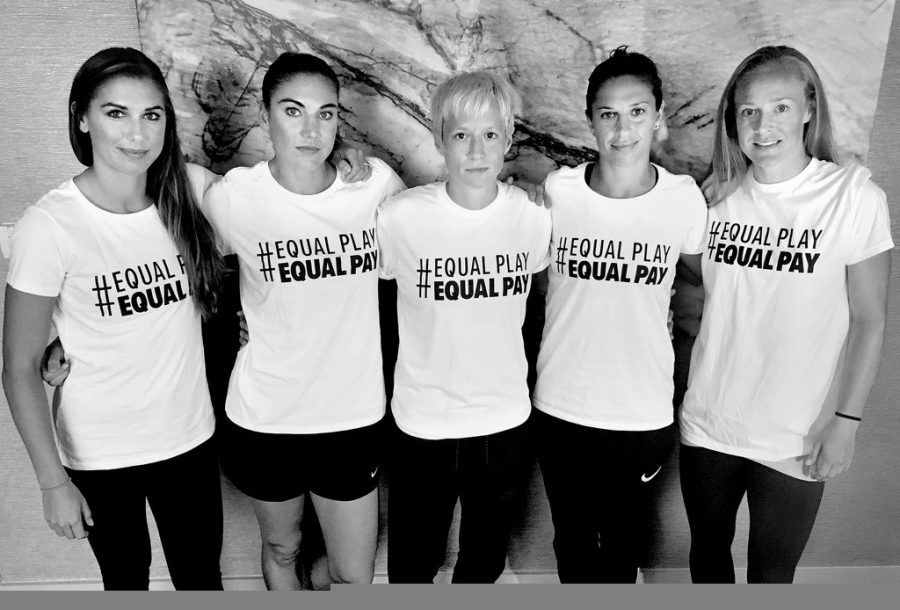US Women’s National Soccer Team sues US Soccer over Gender Discrimination
U.S.W.N.T. Players Association
The U.S. women’s soccer team is using the slogan “Equal Play Equal Pay” to promote their wage fight. From left, Alex Morgan, Hope Solo, Megan Rapinoe, Carli Lloyd and Becky Sauerbrunn.
March 26, 2019
On Friday, March 8, the U.S. Women’s National Soccer Team (USWNT) filed a lawsuit against U.S. Soccer, accusing it of gender discrimination. The complaint was filed in the U.S. District Court of Los Angeles, California.
The complaint argues that U.S. Soccer “has a policy and practice of discriminating” against members of the the women’s national team on the basis of gender, by giving them less pay compared to members of the men’s national team. However, the discrimination also affects “where they play and how often, how they train, the medical treatment and coaching they receive and even how they travel to matches,” Andrew Das, a contributor to The New York Times, reports.
“I think what [the women] are doing is a huge step forward for not only women’s soccer, but women’s sports in general. They are fighting for what they want, and ultimately, what they deserve,” senior Aubrey Magner said.
28 members of the women’s team are named as plaintiffs. The lawsuit seeks to be a class action, representing other women who have played for the USWNT who also may have been denied equal pay for considerably equal work.
“Both sides (men and women) take on a huge task by representing the U.S. in a worldwide athletic platform. However, the women are paid consistently less although they work just as hard as the men’s side,” junior Schuyler Riese said. “The USWNT has also had significantly better results than the men’s side in recent years, but their pay does not represent this. I just think that if the women are putting in just as many hours of hard work to their success and in return, receiving the result of success, their pay should follow.”
How the women’s team earns compensation compared to how the men’s team does is quite different. “Each team has its own collective bargaining agreement with U.S. Soccer, and among the major differences are pay structure: the men receive higher bonuses when they play for the United States, but are paid only when they make the team, while the women receive guaranteed salaries supplemented by smaller match bonuses,” Das wrote.
In 2017, the women’s team reached a new collective bargaining agreement with U.S. Soccer. In 2016, Alex Morgan, Carli Lloyd, Megan Rapinoe and Becky Sauerbrunn – four of the plaintiffs – filed a charge of discrimination with the Equal Employment Opportunity Commission on behalf of themselves and similarly situated members. However, no progress was made, and last month, the EEOC issued letters giving the four the right to sue.
“Each of us is extremely proud to wear the United States jersey, and we also take seriously the responsibility that comes with that,” Morgan said in a statement reported by The Associated Press. “We believe that fighting for gender equality in sports is a part of that responsibility. As players, we deserved to be paid equally for our work, regardless of our gender.”
U.S. Soccer has declined to comment on this pending lawsuit, which came on International Women’s Day and less than three months before the Women’s World Cup takes flight in France.
“The women’s team is far more successful than the men’s team with three World Cup wins, where as the men have none,” Magner said. Four years ago, the U.S. women’s team, currently ranked No. 1 in the world, won the World Cup and yet again, they plan to defend it this year.
While the women’s team hopes to take home another ‘dub,’ they will continue to fight for equal pay. “A comparison of the WNT and MNT pay shows that if each team played 20 friendlies in a year and each team won all twenty friendlies,” the complaint says, “female WNT players would earn a maximum of $99,000 or $4,950 per game, while similarly situated male MNT players would earn an average of $263,320 or $13,166 per game against the various levels of competition they would face.” This basically means that a superb women’s player would only earn about 38 percent of the compensation that an equally superb men’s player would earn.
“The women have been fighting this fight for too long and had to go to the extreme of suing the federation just to be heard in the way they deserve. The lawsuit was the only thing they could do to make this issue important in the federation’s eyes,” Magner said.
In light of this, FIFA, soccer’s international governing body, plans to double the prize money it awards nations at this year’s Women’s World Cup, but the amount of money will still be a fraction of what the men receive.
The union representing the members of the U.S. Men’s National Team, whose own collective bargaining agreement expired last year, issued a statement supporting USWNT’s efforts to receive equal pay. “Specifically, we are committed to the concept of a revenue-sharing model to address the US Soccer Federation’s ‘market realities’ and find a way towards fair compensation. An equal division of revenue attributable to the MNT and WNT programs is our primary pursuit as we engage with the US Soccer Federation in collective bargaining.”









